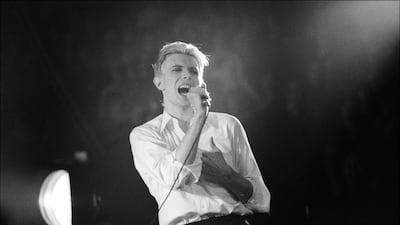When I was 14, one of my schoolmates wrote a song titled Now I Feel Like All My Friends Have Gone. It was at root a fledgling effort, but the predicament of the song's narrator, who pined for the dead rock stars who had so inspired him, came back to me this year as I considered the deaths of David Bowie, Prince and Leonard Cohen.
None of these musicians were friends of mine, of course, so like almost everybody else, I contemplated their passing through a prism built from personal experiences of their music.
My partner and I had Leonard Cohen songs playing when our daughter Carla was born. And when I played Carla, now four, David Bowie's The Laughing Gnome recently, even the Dame's oft-mocked 1967 novelty hit seemed freighted with poignancy as I listened to one of rock 'n' roll's greatest voices at its most carefree.
It was the death of Prince, though, planet rock’s most gifted and glamorous enigma, that really rattled me and all those other ordinary folks for whom pop music has long meant more than it rightly should. The force-field aura of the whip-smart, seemingly super-fit Prince Rogers Nelson was such that we all felt sure he’d be doing his Hadron particle accelerator thing well into his dotage. But it turned out that Prince was just as vulnerable to the laws of physics as anybody else. Another shooting star addicted to prescription drugs, he crashed and burned aged 57.
This year’s seemingly insatiable appetite for the rock and pop star obituary was never going to play out without a few final shockwaves. So, some days after I first submitted this piece, I find myself updating it to include the oh-so-recent deaths of George Michael and Status Quo’s Rick Parfitt.
Though he died peacefully at home due to heart failure, Michael's death at 53 had a similar shock value to that of Prince. It felt at least a generation too soon, and once again we turned to YouTube, where Michael's most masterful performances – whether as frivolous as on Wham!'s 1982 hit Young Guns (Go For It!) or as emotive as his Queen-accompanied take on Somebody to Love at 1992's Freddie Mercury Tribute Concert – had acquired a strange new resonance overnight.
If 2016 has taught us anything about the musicians we love, it’s perhaps this: it’s a fool’s errand to try to second-guess their behaviour or to bend them to our will. Back in October, the Swedish officials behind the Nobel Prize in Literature found that out the hard way, when Bob Dylan, their chosen laureate for 2016, declined to take their calls or even acknowledge his award for more than two weeks.
Only the other week, moreover, Left-leaning fans of Kate Bush were torching copies of their Hounds of Love album when the singer told Canadian magazine Maclean's about her admiration for UK Conservative prime minister, Theresa May. But the real surprise, one might argue, was that anyone was shocked to learn that Bush, a fiercely independent career woman and multi-millionaire from a privileged background, might sympathize with May and possibly have Conservative leanings.
This seeming disjunct between what fans want from the stars they admire and what those stars want for themselves was explored in a piece about Leonard Cohen written almost two years before the great man’s death.
Kevin Mandel's fine essay for The Millions was in essence a response to an interview Cohen gave Rolling Stone in 2014; an interview in which he basically said he didn't give a flying hallelujah about what would become of his songs and poems after death.
Mandel's piece explored the difficulty a fan taken with the monumental heft and resonance of Cohen's back-catalogue might have with the singer's startling pronouncement to Rolling Stone, but it also asked a very pertinent question: "What is my legitimate stake in someone else's posterity?"
In the weeks after his death, the 700-or-so people who claimed to be half-siblings or descendants of Prince had very clear ideas about their 'stake' in his posterity, but thankfully most folks have less mercenary motives. Celebration 2017, a four-day musical event that will take place at Paisley Park, Minnesota, from April 21, is planned for the first anniversary of Prince's death.
All things considered, you have to feel for Prince, because he never got to plan or record the kind of noble, many-layered farewell so beautifully exemplified by Bowie's Blackstar album and Cohen's recent, gravitas-laden swansong, You Want It Darker. What might Prince, that most prolific of writers, have said if he knew that he was making his final musical statement? What sounds might he have coaxed from his guitar? What new heights might he have reached?
James McNair writes for Mojo magazine and The Independent.

